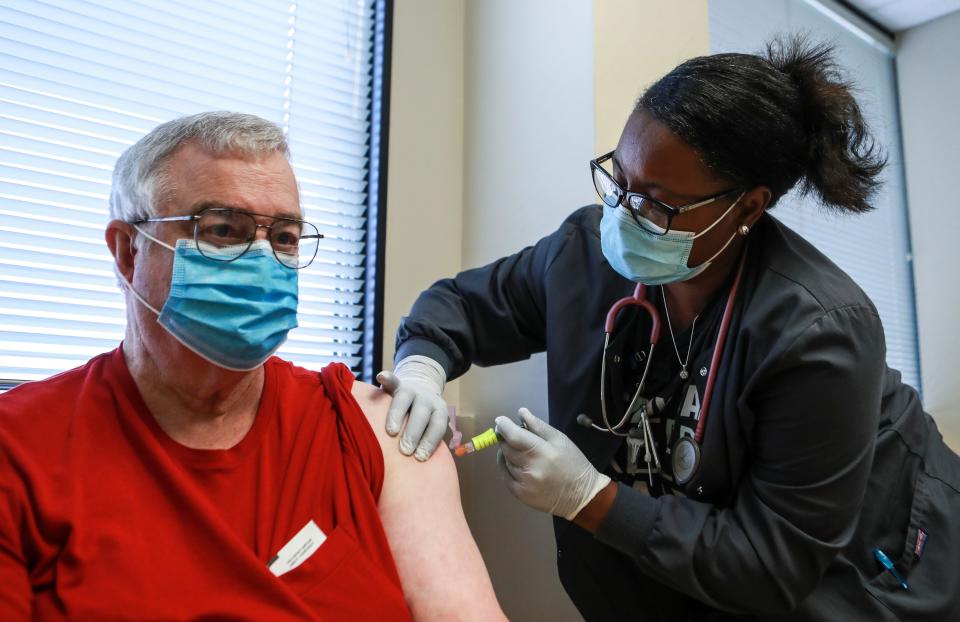How to stay healthy and where to find a vaccine as the flu surges in Kentucky
The 2022-23 flu season is here and it's hitting Kentucky especially hard, with more than 7,000 cases confirmed so far in Louisville and more than 23,000 around the state.
In a weekly update email on Dec. 9, Louisville Mayor Greg Fischer and other city leaders joined the Louisville Metro Public Health and Wellness Department to urge local residents to stay up to date on vaccinations, including flu shots.
It's not too late to get vaccinated, or to take other steps to try to stay healthy. Here's a quick look at what to expect this season.

When does the flu season start?
The flu season starts usually around October, according to the Centers for Disease Control and Prevention. The season usually carries through the colder months in the fall and winter seasons and reaches the apex of cases between December and February, which are usually the coldest months of the year.
For subscribers:Lawton Court could disappear as a company expands. But some are fighting for it to stay
What are flu symptoms?
Flu symptoms: Fever, chills, muscle aches, cough, congestion, runny nose, headache and fatigue.
Flu strains: There are four types of influenza viruses – A, B, C and D – but the strains that typically cause seasonal flu illness are influenza A and B. The CDC says influenza C primarily causes mild disease and influenza D is normally seen in cattle, not people.
What is the difference between a cold and flu?
Cold symptoms are generally less severe than the flu, but many symptoms overlap: fever, runny nose, sore throat, coughing and general fatigue.
The only definitive way to know the difference between a cold or the flu is through testing, experts say. Patients can be tested simultaneously for COVID-19 and influenza with a single swab.
How long does the flu last?
Signs and symptoms of the flu typically resolve after three to seven days, according to the CDC, but general weakness and fatigue can last up to two weeks.
When can I get a flu shot?
As soon as possible, according to health authorities like the CDC. If you have not already gotten your flu shot this season, the University of Louisville Hospital is offering free vaccines for the flu, mpox and COVID-19. Flu vaccinations can also be scheduled at local pharmacies like CVS and Walgreens.
How can I keep from getting the flu during the holidays?
The CDC's guide on how to protect yourself and others from the flu is a good resource this holiday season.
Flu vaccinations, according to health experts, are the best step to keep healthy, but Dr. Jeff Howard, the interim director at Louisville Metro Public Health and Wellness, offered other tips, including:
staying home if you are sick;
keeping frequently touched surfaces clean;
ventilating indoor spaces when possible;
and wearing a mask in crowded areas.
"The bottom line is that these viruses are here to stay," Howard said this week. "... The best thing you can do to protect yourself is getting a vaccine."
More headlines:LG&E and KU step away from coal, toward natural gas and solar in new plan
How to treat the flu
Experts say most flu infections can be treated at home with rest and plenty of fluids. Doctors can, however, prescribe an antiviral to patients who are at risk of severe disease.
Four antivirals are authorized for flu in the United States, but the most widely used is known by its brand name Tamiflu.
But antivirals work best when taken early in the disease, so it's important to discuss options with a doctor before getting sick, said Dr. Pedro Piedra, professor of molecular virology and microbiology at Baylor College of Medicine.
"We’re into the flu season now without a question, and there's a lot of it all around us," he said. "Planning ahead is important."
Contact Caleb Stultz at cstultz@gannett.com. Follow him on Twitter at @Caleb_Stultz. USA Today reporter Adrianna Rodriguez contributed to this article.
This article originally appeared on Louisville Courier Journal: Flu treatment, symptoms, vaccines: What to know this season

